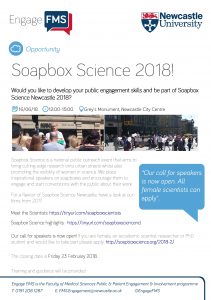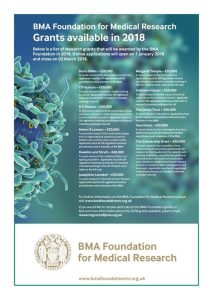
Soapbox Science Newcastle 2018 call for speakers 15.12.17 FV

The BMA Foundation for Medical Research provides approximately £600,000 of research funding annually, this year across 11 different grants. Details of the 2018 grants have now been confirmed and all grant categories can be viewed in the poster below or on the BMA Foundation website here. Applications are invited from medical practitioners and/or research scientists for research in progress or prospective research.
All BMA Foundation grants will be available to apply for online on the BMA Foundation website from 01 January 2018. The application deadline is 2 March 2018.

For any further information on the BMA Foundation for Medical Research please see our webpages www.bmafoundationmr.org.uk or feel free to contact us directly at researchgrants@bma.org.uk or 020 7383 6341.
19 March 2018, University of Leeds
RiDNet is a student-led network of PhD students and early career researchers working in international development and/or conducting social research in developing countries. The conference is a great opportunity for students and early career researchers to share their experiences, research and methods with industry experts as well as leading academics.
This year, the conference aims to explore the methods and tools used to measure, evaluate and document development, both in the world of academia and in development practice. The conference will focus on three themes:
RiDnet welcomes abstracts of papers from PhD students and early career researchers. Please email a 300-word (maximum) abstract to ridnet@leeds.ac.uk by 19 January 2018. Selected applicants will be informed within 3-4 weeks of the closing date. They will be given up to 10 minutes to make a presentation, after which 3-5 minutes will be spent taking questions or discussing.
Deadline 31 January 2018
The British Academy has launched a new funding scheme for Visiting Fellowships. These Fellowships provide academics based in any country overseas (and active at any career stage and in any discipline within the humanities and social sciences) with the opportunity to be based at a UK higher education or other research institution of their choice for up to six months. Visiting Fellows will work with colleagues at UK host institutions in order to develop new research collaborations and/or deepen existing partnerships.
Candidates need not necessarily apply to develop collaboration with UK scholars active within the same discipline. The Fellowships are open also to applicants who wish to work with UK colleagues in other areas or disciplines (including scholars within the natural, medical, or engineering sciences), in a cross- or inter-disciplinary way.
Awards of up to £33,000 are available. Funding can be used to support subsistence and accommodation costs, research expenses, travel expenses and a contribution of 50% of the total award to enable the UK institution to host the fellow.
https://wellcome.ac.uk/funding/multi-user-equipment-grants
Deadline: Outline 12th January 2018, Full 6th April 2018
Duration: Up to 5 years
Amount: £100k – £1M
What Wellcome are looking for:
Expenses may include:
The host organisation must provide a supporting statement that outlines:
The host organisation should contribute at least 25 per cent towards the cost of the equipment.
Contributions can include support in-kind as well as money, such as the provision of a key support post.
Please ensure to read the full application details available through the link above.
(Government ten-year framework for mental health research in the UK)https://www.gov.uk/government/publications/a-framework-for-mental-health-research
This framework (launched 07/12/17) provides a collective view of how mental health research should develop in the UK over the next decade.
It sets out a structure to improve co-ordination and strengthen the focus on areas where mental health research is likely to translate into significant health benefit.
This document is a response to a recommendation in the Five Year Forward View for Mental Health report that the Department of Health lead on the development of a 10-year strategy for mental health research.
The Five Year Forward View for Mental Health report was published in February 2016 by the independent Mental Health Taskforce.
The NIHR has launched 5 new mental health research funding opportunities into the promotion of good mental health and the prevention or treatment of mental ill health.
This is coincides with the launch of the framework for mental health research: https://www.gov.uk/government/publications/a-framework-for-mental-health-research
17/110 EME Mental Health Themed Call
Closing date: 27 March 2018
The EME Programme are participating in the Themed Call: promotion of good mental health and the prevention or treatment of mental ill health across the whole life course
17/113 HTA Mental Health Themed Call (Primary Research)
Closing date: 28 March 2018
The HTA Programme are participating in the Themed Call: promotion of good mental health and the prevention or treatment of mental ill health across the whole life course
17/152 HTA Mental Health Themed Call (Evidence Synthesis)
Closing date: 28 March 2018
The HTA Programme are participating in the Themed Call: promotion of good mental health and the prevention or treatment of mental ill health across the whole life course
17/111 PHR Mental Health Themed Call
Closing date: 10 April 2018
The PHR Programme are participating in the Themed Call: promotion of good mental health and the prevention or treatment of mental ill health across the whole life course
17/112 HS&DR Mental Health Themed Call
Closing date: 26 April 2018
The HS&DR Programme are participating in the Themed Call: promotion of good mental health and the prevention or treatment of mental ill health across the whole life course
Deadline: 4pm, 22 March 2018
Duration: 48 months, to start in 2018
Amount: £1.25m @ 100%fEC, (£9-10m budget for six and ten awards that will, collectively, address the breadth of research areas). No limit of applications per RO.
The aim of the call is to encourage the creation of multi-disciplinary networks that cross the remit boundaries of the research councils. These networks will address important mental health research questions that require an innovative, cross-disciplinary approach to accelerate progress; to build cross-disciplinary research capacity in the field; and to strengthen the UK mental health research base.
The call has been informed by the research councils recently published Cross-disciplinary Mental Health Research Agenda (RCUK website) which represents their collective interest in supporting and furthering mental health research. It encourages areas where high quality cross-disciplinary research could add the most value and impact to the broader mental health research landscape through novel and transformative research.
Research areas:
Cross-cutting themes:
As well as helping to build cross-disciplinary capacity within the mental health research field and facilitating knowledge exchange, the successful networks will be able to fund small research projects that will answer specific research questions relevant to one or more of the research area(s) listed above.
The additional planned activities and objectives could include running workshops and other networking events, funding short discipline hops, and feeding into policy and practice.
In addition each network will set aside an appropriate amount of ‘plus’ funds that can be used for organising activities open to the whole research community throughout the period of the award.
It is expected that the application process for network plus funded activities will allow for applicants from outside of the network to participate, thereby drawing more people into the community of researchers.
Applications for network plus awards should outline appropriate plans, including timelines, governance and assessment criteria, for the distribution of ‘plus’ funding.
Please ensure to read the full call guidance documents and FAQs available through the link above.
If you are thinking of applying, please could you email Dr Gwen Averley and Darren Airey so that we are aware of potentially overlapping bids.
5 January 2018, 5pm – Mandatory attendance – Registration deadline for community meeting to be held in London on 17 January 2018
24 January 2018, 4pm (EoI) through Je-S
BBSRC Networks in Industrial Biotechnology and Bioenergy (NIBB) Phase II
http://www.bbsrc.ac.uk/funding/filter/networks-in-industrial-biotechnology-bioenergy-phase2/
up to £10m is available to fund a number of UK-wide multidisciplinary Networks, of varying scales, focusing on a broad range of fundamental and strategic challenges and questions facing the IBBE area.
Networks will operate for up to 5 years and are expected to become self-sustaining beyond this.
Applicants intending to submit an Expression of Interest must attend and present their proposed Network at the Community meeting being held in London on 17 January 2018.
Registration for the community meeting is via Key Survey here and closes 5 January 2018, 16:00. Register at the BBSRC NIBB Phase 2 Community Meeting registration page.
The networks will be interdisciplinary, working across the engineering, physical, chemical and biological sciences research communities.
The objectives of this call are:
Note also:
Previous Networks are listed here:
http://www.bbsrc.ac.uk/research/programmes-networks/research-networks/nibb/